Posted by
on
Living and traveling full-time in my Class C RV since 2016, I have experienced more extreme weather this year than any other time. I have encountered tornado watches in Wyoming, windstorms that knocked down trees, and blocked forest roads causing difficulty to get out. I have been in heavy winds in the desert, to the derecho (which is a long stream of wind and thunderstorms), that I had to escape in Wisconsin. With these real-life lessons, I’ve learned it is imperative to know safety tips for RV living and extreme weather.
Just recently, I was under another tornado watch in Arkansas. I found out the next day after waking up I was only a hundred miles from the tornadoes that wreaked devastation across four states. My heart and thoughts are with everyone affected by that horrible devastation caused by those tornadoes. Sadly, I think severe weather occurrences are only going to get worse. So it’s critical to know how to keep yourself and your loved ones safe, especially if you live in a vehicle.
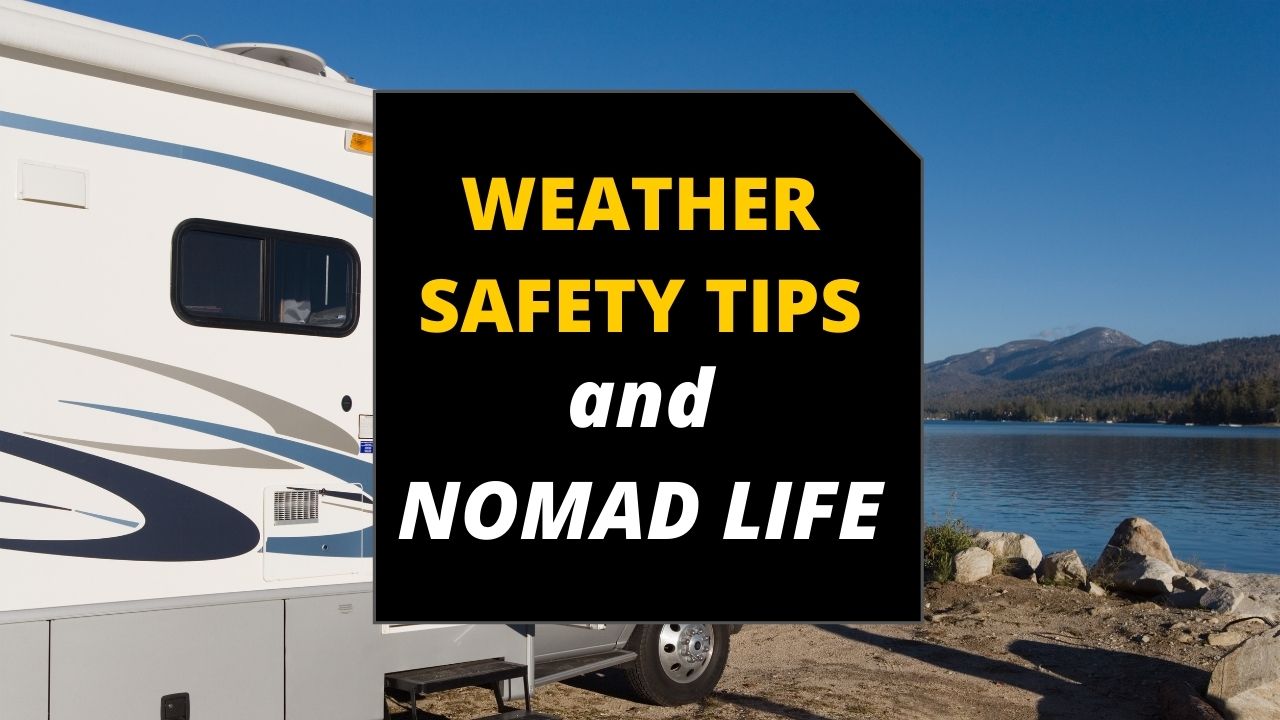
Living as a Nomad, either in an RV, bus, or car, we are at higher risk than any other group. What puts us at higher risk? We’re often in unfamiliar places. Living in California most of my adult life, I know what to do and where to go for help if there was an Earthquake. I was familiar with the community and the resources offered. Nomads do not have that familiarity. We are at a disadvantage, especially if we are moving a lot. We probably won’t know the surrounding area, where the safe places are, where to get help, and in some cases, we don’t even know what to expect from the weather.
As I was lying in bed the other night, I started getting alert after alert on my phone for a tornado watch. My first thought was that I don’t know what to do if a tornado hits! I don’t even know if there are warning signs before a tornado hits. This situation got me thinking about other nomads and newbie RVers. So, I decided to put together the single most comprehensive bad weather/extreme weather safety guide out there. I will share how to stay safe in tornadoes, hurricanes, severe thunderstorms, high wind events, earthquakes, flash floods, and extreme hot/cold temperatures. Everything you need to stay safe while living in your vehicles and traveling is right here in one place.
Here is a baseline guide of seven things you need to have in an emergency. These are general tips for just about anything, whether living a nomadic lifestyle or even a static lifestyle, that will help you be prepared in an emergency.

1) Keep a cell phone charged and a charged backup battery.
2) Have clean water and food ready.
3) Fill your gas tank.
3) Have a bug-out bag packed with a flashlight, cell phone charger and backup battery, a transistor radio and batteries, a flashlight, water purification system, and your important papers (ID, Passport, medical records, prescriptions, bank info, etc.) and don’t forget your Vet records for your pet.
4) Have a plan for your pet.
5) Know your area- what weather is it prone to?
6) Be familiar with the nearest shelter/grocery store/gas station/hospital/vet/ have emergency phone numbers on hand for the area.
7) Have a reliable weather alert system in place.
These are general safety tips to help you be more prepared in case of a major emergency. Now let’s talk about specific weather types you may encounter while traveling the country and how to stay safe.
The first one is not weather-related, but still an environmental threat: Earthquakes. In California, it is common for people to jokingly say, “It feels like earthquake weather today.” Really, there is no scientific evidence that weather changes cause earthquakes, and there are no warning signs. Here are important things to know and do in the event of an earthquake.
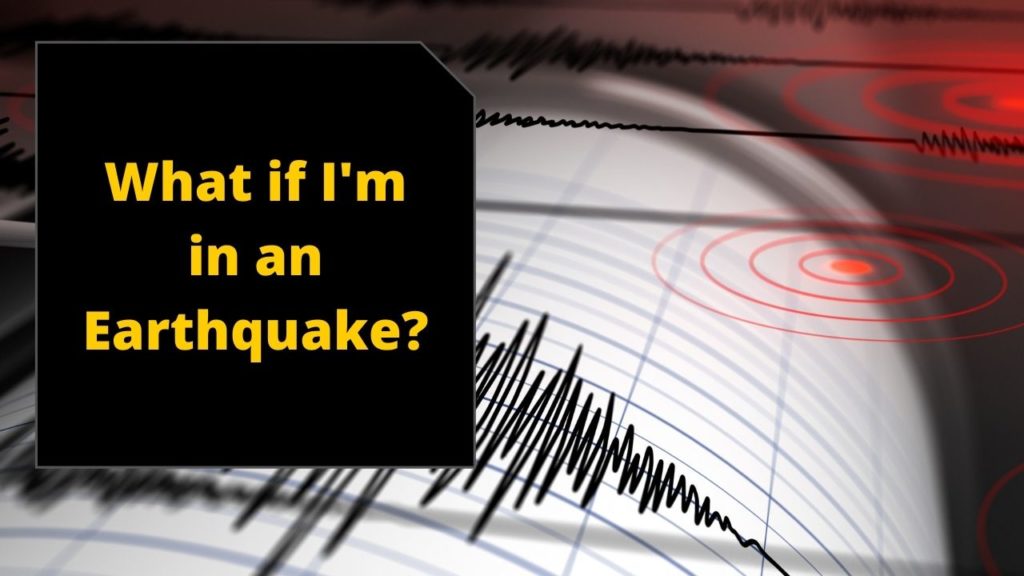
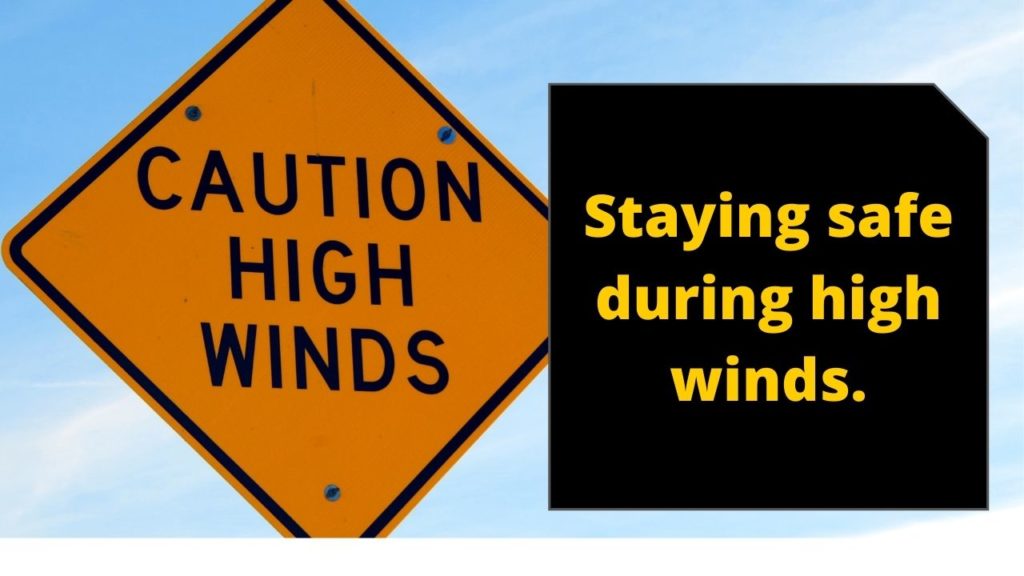
Wind as low as 10 miles per hour can cause problems when driving an RV. Always be aware of this. I have encountered some pretty heavy wind while driving, and it is not a fun experience. The wind can flip your RV around like a soccer ball. Most RVs can withstand winds up to 75 miles per hour when parked. So remember, it’s usually safer to be parked during a wind storm.
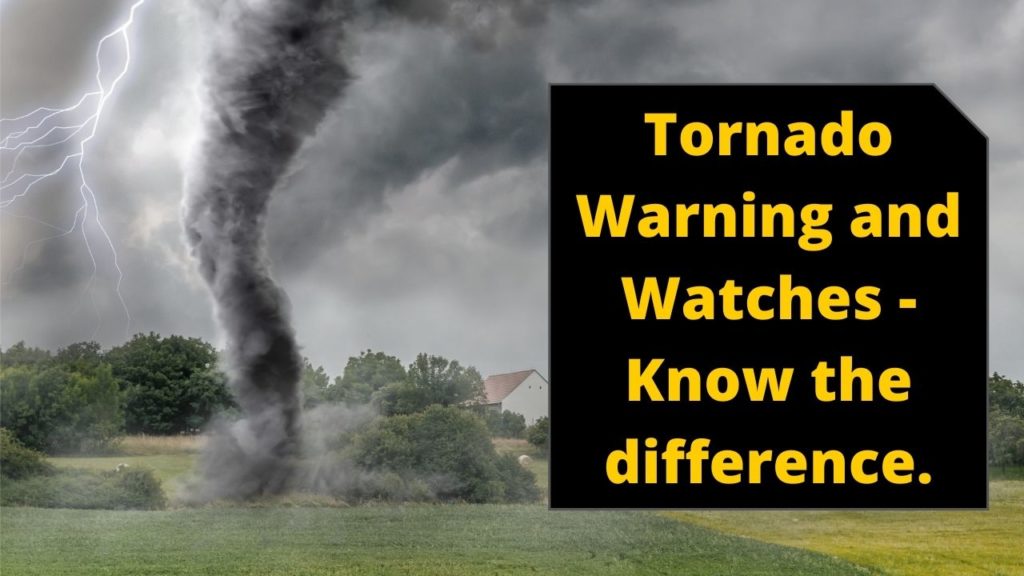
I was a hundred miles from the crazy tornadoes that ripped through four states on December 11, 2021. I was under a tornado watch for 12 hours. For those not living in tornado alley, in case you did not know, the weather service issues a tornado watch and then a tornado warning. A tornado watch is not as serious as a warning. With a tornado warning, you need to be hyper-vigilant and pay attention to what is going on around you. The tornado watch was supposed to end at Midnight.
As I tried to go to sleep, I kept getting alert after alert on my phone, updating the situation to let me know what was happening in my area. I could see lightning all around me. I started thinking, “Will I know if a tornado is coming? What will I do? Should I stay in my RV?” I want you to remember that just because you are only under a watch, this does not mean you are not in danger! Tornadoes can change directions in an instant. Below are ways I found you can stay safe during a tornado while staying in your RV or vehicle.
Tornadoes also come with the danger of unpredictability because we often do not always know the direction they will continue to travel in. I would rather stay where I am than be on the road in severe weather. Just because we live on wheels, it does not mean that it is always an option to drive away. Hurricanes also come with this same danger.
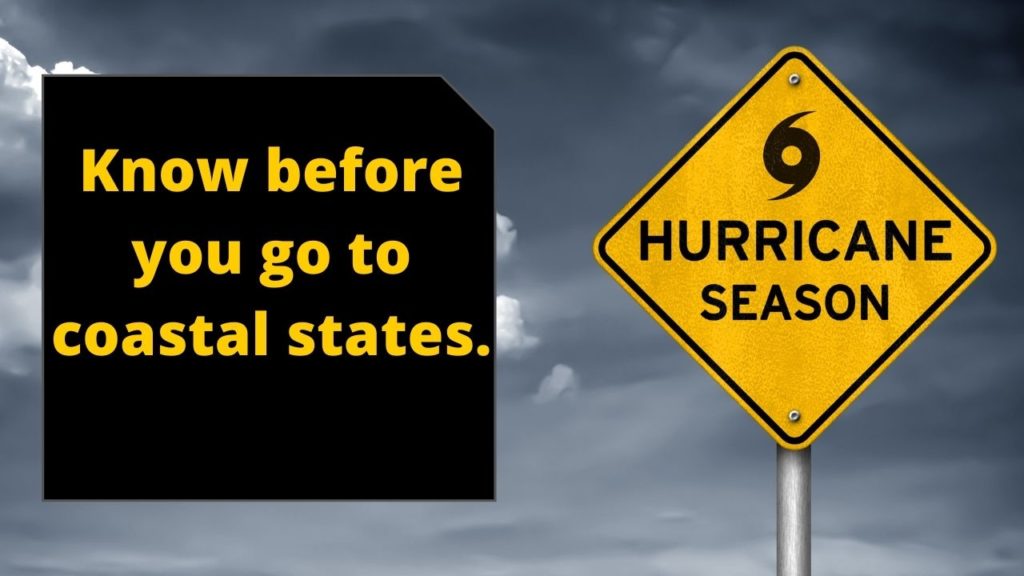
Did you know there is an actual hurricane season? Right now, this schedule is fluid because of the changing environment. The current seasons to be aware of for hurricanes are:
Eastern Pacific Hurricane Season: May 15 – November 30.
Atlantic Hurricane Season: June 1 – November 30.
Central Pacific Hurricane Season: June 1 – November 30.
Emergency sirens sound to alert residents of a hurricane (or tornado) approaching. Most communities in hurricane/tornado regions use sirens, so find out if the area you are staying in uses emergency sirens. Remember, you do not want to prevent yourself from hearing the sirens at night, so do not sleep with headphones or ambient noise playing too loud. Follow the below guidelines to stay safe during a hurricane in your RV.
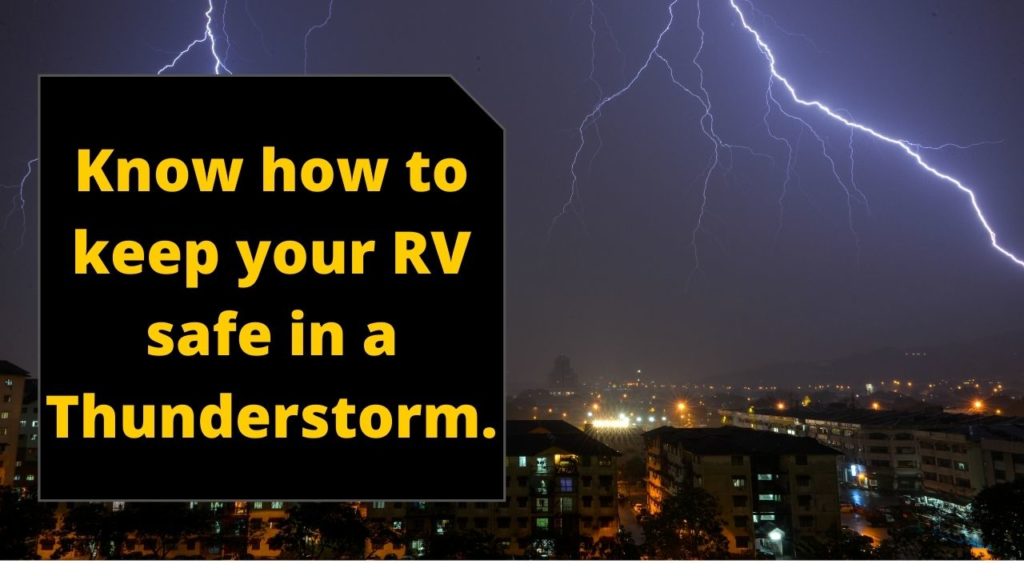
Midwest weather in the summer and fall usually consists of rain and thunderstorms. How do we stay safe in our RVs during severe thunderstorms?
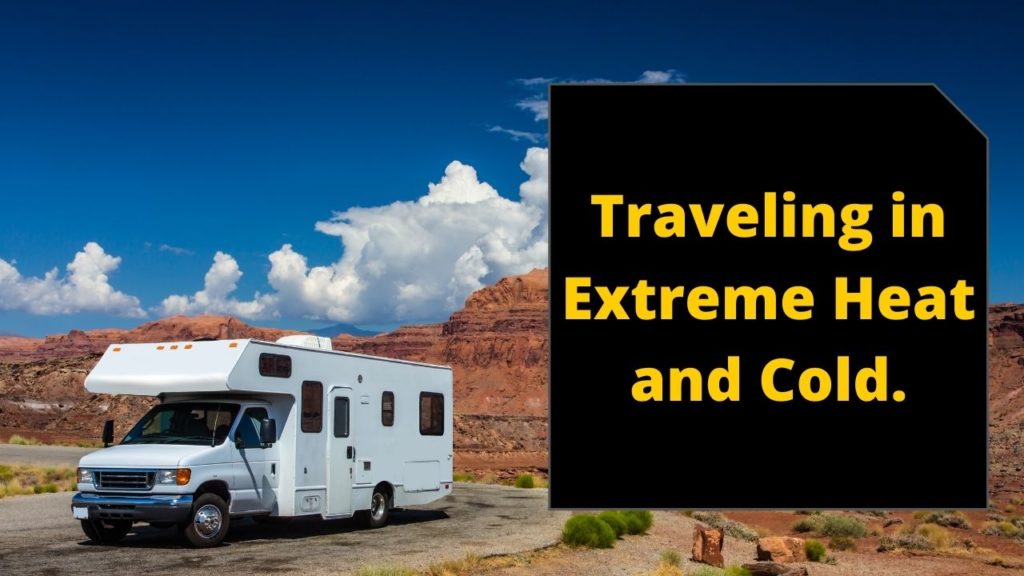
We’re going to be seeing more extreme heat and cold in the years to come. It’s difficult to escape the heat and cold when living in an RV. So what do you do? You can change your elevation.
You can visit my Shop Page here to view items I use to heat my RV. Visit my Amazon Store here for more ideas for your RV.
Now let’s talk about some of the best resources that you can use to stay safe on the road when encountering extreme weather. The first tool I want to tell you about is the NOAA all-hazards radiofrequency. Did you know 98% of the population is under their radio frequency? Visit www.weather.gov/nwr for a list of radio stations where you can get up-to-date weather information.
The second one is the App called CLIME. This App is the NOAA Weather Radar Live app that is an all-in-one weather tracker and uses your GPS signal to alert you on conditions where you are in real-time. This App, by the way, told me I was under a tornado watch. It sent alerts to me on the tornado status and thunderstorm status. I had my alerts turned on for both. I received a notification every time lightning struck within five miles. The app uses real-time radar and enables you to see which direction the storm is going. Monitoring the storm around me and saw I was just on the edge of it. Using the App, I escaped the derecho up in the Midwest. I just barely missed it! I drove out of the path of the storm using this app as a guide.
The final resource I want to tell you about is a guy on YouTube. This guy is amazing! His information is better than most weather stations or weather channels. He’s called Ryan Hall Y’all. You can follow him on YouTube, Instagram, and Twitter. He seems to be an amateur meteorologist and avid weather enthusiast that borders on expert predictions. I’ve been keeping an eye on him for awhile, and he is good at predicting the direction storms are traveling and new storm development. Ryan is very thorough and very meticulous about his data. I think he is an excellent resource. I have subscribed to his channel and am now going to be using his information for planning purposes. Check out his YouTube channel here.
I hope you found this helpful and a resource that you will refer to time again, in your RV life and maybe even in your regular sticks and bricks life. Check out the video I posted with all this information as well!
Here are some quick resources I used to put this guide together.
Ready.gov for all emergencies
Another video you might like from my channel about high winds: Surviving Crazy Winds in an RV
And as always…
BE HAPPY, BE FREE, BE KIND. ♥ Subscribe to my YouTube Channel for more RV Life How Tos and Not Tos.
DISCLAIMER: Carolyn’s RV Life and Carolyn Higgins share her experiences, thoughts, opinions and ideas in this blog post and on this website for entertainment purposes only. It is not intended to be a substitute for professional advice, instruction or guidance. Viewers/Readers should consult with professionals before pursing any actions or behaviors exhibited in this video. Carolyn’s RV Life or Carolyn Higgins cannot be held liable in the event of any accident or injury that may occur as a result of application of procedures and information provided in this video.
Join the Fun! Subscribe to Carolyn’s RV Life email list and get stories, pictures, videos, advice, tips, and more!
Want to receive sneak peaks, insider news and exclusive content? Join the Carolyn’s RV Life Patreon Community!
3 Responses
Many towns along Southern gulf in FL. no longer use sirens, they send hurricane alerts to your phone. The weatherman will warn you days in advance. You are in an RV don’t Hunkerdown , hit the road and evacuate.
Worried about your phone or other electronics , during a lightning storm. Put them in your oven . It works as a Faraday cage to protect them, when we sailed that’s what we did with our gps and chart plotters.
Hi Carolyn n thanks for the I fo on weather safety. I think the advice on getting out of your rv if parked under power Lindsay be incorrect. I think you’re safer inside your rv because the rubber tires will protect you. If you go outside power lines will be attracted to you. Just my thought. You do an amazing job. I finally bought my van n think I’ll head to quartzite the end of the month! Excited
Hi Karen, thanks for your comment. If a powerline falls on your vehicle your vehicle becomes electrified even with the rubber tires, which means you’re at a huge risk of being electrocuted. https://www.wikihow.com/React-if-a-Power-Line-Falls-on-Your-Car
Humans aren’t at risk of power lines unless they fall on them.
I stand by my advice to get out and NOT stand under powerlines.